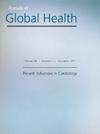Integrating Oral Health Within Kenyan HIV Research & Policy Structure: Stakeholder Analysis
IF 2.6
4区 医学
Q2 PUBLIC, ENVIRONMENTAL & OCCUPATIONAL HEALTH
引用次数: 0
Abstract
Background: Kenya has a remarkably high burden of oral diseases, especially in vulnerable communities like persons with HIV (PWH). In the last few decades, the National AIDS & STI Control Programme has efficiently and successfully provided care and prevention against HIV for people living in Kenya. Objective: To assess the feasibility of integrating oral health into HIV research and policy structures in Kenya. Methods: The study took place between November 2021 and April 2022 in the cities of Nairobi, Kisumu, Mombasa, and Eldoret town. Using a semi-structured interview, three remote and 14 in-person sessions were conducted. Participants included individuals with professional experience in HIV and/or oral health such as researchers, potential mentors, institutional administrators, and other grant-funded experts. A qualitative analysis of recordings was performed by nine pretested independent reviewers, all with qualitative data analysis experience. Areas of interest included research, motivation, obstacles, and support. The free coding phase as well as an iterative grouping analysis (MIRO) was used. Findings: Of the 22 stakeholders interviewed in the study, researchers accounted for the majority (48%) of stakeholders, with the rest composed of practitioners (29%), university administrators (19%), and one public health administrator. University administrators were identified as having the most ability for resource mobilization followed by researchers and practitioners. All participants desired improved health outcomes using an evidence-based approach. The primary motivators were increased networks, collaborations, publications, and bridging the gap between oral health and HIV. While the obstacles to their desires included time and lack of funding, Institutional support through recruitment of qualified personnel, mentors, and mentees was their major desirable support. Conclusion: Stakeholders were unanimous in supporting integrating oral health within the current research and policy environment to address the gap between oral health and HIV, and to improve health outcomes through evidence-based interventions.将口腔健康纳入肯尼亚艾滋病研究与政策结构:利益相关者分析
背景:肯尼亚的口腔疾病负担很重,尤其是在艾滋病毒感染者(PWH)等弱势人群中。在过去的几十年里,国家艾滋病和性传播感染控制计划为肯尼亚的艾滋病患者提供了高效、成功的护理和预防服务。目标评估将口腔健康纳入肯尼亚 HIV 研究和政策结构的可行性。方法:研究于 2021 年 11 月至 2022 年 4 月在内罗毕、基苏木、蒙巴萨和埃尔多雷特镇进行。采用半结构化访谈法,进行了 3 次远程访谈和 14 次面对面访谈。参与者包括在艾滋病和/或口腔健康方面具有专业经验的个人,如研究人员、潜在导师、机构管理人员和其他获得资助的专家。录音的定性分析由九名经过预先测试的独立审查员进行,他们都具有定性数据分析经验。感兴趣的领域包括研究、动机、障碍和支持。采用了自由编码阶段和迭代分组分析法(MIRO)。研究结果在接受访谈的 22 位利益相关者中,研究人员占大多数(48%),其余包括从业人员(29%)、大学管理人员(19%)和一位公共卫生管理人员。大学管理人员被认为最有能力调动资源,其次是研究人员和从业人员。所有参与者都希望采用循证方法来改善健康成果。他们的主要动机是增加网络、合作、出版物,以及缩小口腔健康与艾滋病之间的差距。虽然实现他们愿望的障碍包括时间和缺乏资金,但通过招聘合格人员、导师和被指导者提供机构支持是他们最希望得到的支持。结论:利益相关者一致支持将口腔健康纳入当前的研究和政策环境,以解决口腔健康与 HIV 之间的差距,并通过循证干预改善健康结果。
本文章由计算机程序翻译,如有差异,请以英文原文为准。
求助全文
约1分钟内获得全文
求助全文
来源期刊

Annals of Global Health
PUBLIC, ENVIRONMENTAL & OCCUPATIONAL HEALTH-
CiteScore
5.30
自引率
3.40%
发文量
95
审稿时长
11 weeks
期刊介绍:
ANNALS OF GLOBAL HEALTH is a peer-reviewed, open access journal focused on global health. The journal’s mission is to advance and disseminate knowledge of global health. Its goals are improve the health and well-being of all people, advance health equity and promote wise stewardship of the earth’s environment.
The journal is published by the Boston College Global Public Health Program. It was founded in 1934 by the Icahn School of Medicine at Mount Sinai as the Mount Sinai Journal of Medicine. It is a partner journal of the Consortium of Universities for Global Health.
 求助内容:
求助内容: 应助结果提醒方式:
应助结果提醒方式:


